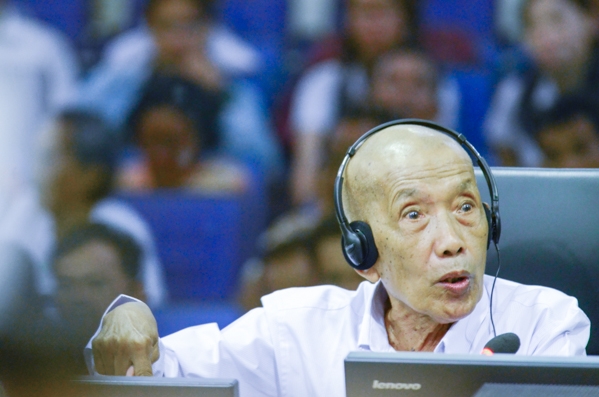In his last full day of testimony, S-21 detention center chief Kaing Guek Eav continued his contentious time on the witness stand, with the defense for Khmer Rouge leaders Nuon Chea and Khieu Samphan continuing their effort to question his knowledge and memory of the inner workings of the genocidal regime.
Anta Guisse, a lawyer for Mr. Samphan, continued her questioning from the day before, asking him about a meeting with Mr. Samphan that directly contradicted statements he previously made of never meeting him. In addition, she asked him about the arrest and execution of other Khmer Rouge leaders.
Ms. Guisse confronted Mr. Guek Eav, commonly known as Duch, over his lack of knowledge about the way the Khmer Rouge was run, telling him: “You were far from the center. You did not know how the center or Politburo functioned.”
“My previous response was clear,” Mr. Guek Eav said. “If you are a person with a brain you should understand it well.”
Victor Koppe, a lawyer for Mr. Chea, then took over, continuing his line of questioning from previous days about potential plots to overthrow the Khmer Rouge.
Mr. Koppe spent a significant portion of the day on 10 statements from former combatants from Division 310 describing a plan to take over a radio station and the airport in Phnom Penh.
“These statements are just surreal and do not seem to be a concrete plan at all,” he told the court. “I do not believe these statements at all.”
Mr. Koppe also asked him about the purges of communists in Indonesia in 1965, with the help of the United States, and whether they had any effect on the Khmer Rouge.
“The Khmer Rouge at that time learned about the situation in Indonesia,” he said. “The coup d’état in Indonesia was engaged by the Americans to topple the three organs in Indonesia. I was thinking that the situation may happen in Cambodia.”
Attempting to bring much of his questioning over the past few days to a head, Mr. Koppe asked Mr. Guek Eav about his general knowledge of the major crimes committed by the Khmer Rouge and whether they were definitive, party-led stances.
Mr. Guek Eav initially said he was unaware of any policy to commit genocide against Cham Muslims, to which Mr. Koppe forcefully responded in his next question.
“So you were unaware of any policy to target Vietnamese citizens, unaware of policy to kill Lon Nol soldiers, unaware of policy to exterminate the Cham and unaware of a policy on forced marriages,” Mr. Koppe said to Mr. Guek Eav before receiving tough rebukes from both the court president and members of the prosecution.
“There were no documents stating party lines about these issues,” Mr. Guek Eav said in response.
Mr. Guek Eav will finish his time on the witness stand on Monday morning.
http://www.khmertimeskh.com/news/26492/duch-discusses-purges--indonesia/







